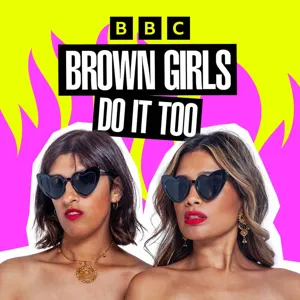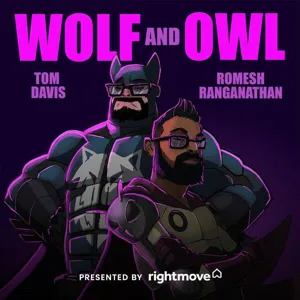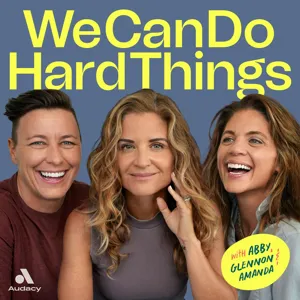Podcast Summary
Exploring Love, Sex, Identity, and Acceptance: Embrace self-discovery and the fluidity of sexuality and identity. Accept and celebrate loved ones, especially on Mother's Day.
This podcast episode explores themes of love, sex, identity, and acceptance. The hosts, Poppy and Rubina, discuss their own experiences with sexuality and the complexities that come with it. Poppy identifies as curious and open to the possibility of being with a woman, while Rubina finds herself unable to define her sexuality. They also touch on their experiences with queerness and coming to terms with their sexual identities. Additionally, they encourage listeners to accept them for who they are and to celebrate Mother's Day by giving back to the special moms in their lives through 1-800-Flowers.com, where listeners can save up to 40% off select Mother's Day items with the promo code "acast." The episode also highlights the importance of self-discovery and the fluidity of sexuality and identity.
Impact of Community Norms on Language and Attitudes: Community norms and upbringing can shape harmful language and attitudes towards certain groups. Reflecting on past biases and seeking positive influences can help broaden understanding and promote inclusivity.
Language and attitudes towards certain groups can be shaped by our upbringing and community norms, even if those attitudes are harmful or outdated. The speaker shares an example of using homophobic slurs casually growing up in a South Asian community, but later recognizing the harm and stopping its use. They also mention how figures like Graham Norton helped challenge these perceptions and broaden understanding within their community. Additionally, the speaker shares a personal experience of being nervous around a potential romantic interest due to societal beauty standards, highlighting the impact of external influences on our self-perception and preferences. Overall, this conversation underscores the importance of reflecting on our past and challenging harmful biases, as well as the role of positive influences in shaping more inclusive attitudes.
The Importance of Representation in Media: Representation matters for fostering acceptance and understanding of diverse bodies and identities. Authentic representation in media is crucial for underrepresented communities, including acknowledging and celebrating nipple diversity and respecting individual preferences.
Representation matters, especially when it comes to our understanding and acceptance of our own bodies and identities. Sharon Dhaliwal and Shar Bailey, two incredible British Asian and queer women, shared their experiences growing up and the impact of seeing themselves represented in media. They discussed the confusion and disconnect they felt when the representation they saw didn't match their own experiences. This conversation highlighted the importance of acknowledging and celebrating nipple diversity and the need for authentic representation in media, particularly for underrepresented communities. Additionally, they spoke about their identities and the importance of using correct language and respecting individual preferences. Overall, this conversation emphasized the importance of representation, acceptance, and understanding in fostering a more inclusive and affirming society.
Exploring Intimacy in Queer Relationships: Open communication, respect, and understanding are essential for healthy relationships, regardless of sexual orientation or cultural background.
Queer relationships can bring a unique level of intimacy, communication, and care to sexual experiences. People in these relationships are often open about expressing their desires and asking for what they want, creating a more giving and respectful dynamic. The speaker also mentions a personal observation of being more respectful and considerate towards women, especially in romantic relationships, due to their own experiences and the challenges women face. The speaker also shares their experiences of growing up in a South Asian community where queerness was hidden and discusses the impact of societal homophobia and the challenges of defining one's identity at a young age. Overall, the discussion highlights the importance of open communication, respect, and understanding in relationships, regardless of sexual orientation or cultural background.
A queer Indian woman's journey of self-discovery and acceptance: Embrace self-acceptance and find joy in supportive relationships to overcome societal pressures and personal struggles with sexuality.
The journey of self-discovery and acceptance of one's sexuality can be influenced by various factors, including societal norms, family dynamics, and personal beliefs. The speaker shared her experiences of growing up as a queer Indian woman, dealing with societal pressures, and the challenges of coming out to her family. She mentioned that while some family members were accepting, others were not, and this was largely due to their upbringing and attitudes. The speaker also talked about her initial feelings of shame and confusion when she realized she was attracted to women, and how she tried to hide her identity by dating men. Ultimately, she found joy and acceptance when she embraced her true self and met someone who supported her. The speaker's story highlights the importance of self-acceptance and the role that supportive relationships can play in overcoming societal pressures and personal struggles.
Understanding healthy relationships for lesbians: Communication and consent are crucial for lesbian relationships, creating a more intimate and respectful dynamic, but can make casual sex more challenging.
Growing up with same-sex attraction, finding representation and communities can be crucial in understanding and experiencing healthy sexual relationships. For those identifying as lesbian, the emphasis on communication and consent creates a more intimate and respectful dynamic. However, this can also make casual sex more challenging due to the need for open conversation and establishing boundaries. Ultimately, the effort put into building these connections leads to a more satisfying and fulfilling sexual experience. It's essential to remember that everyone's experiences are unique, and it's okay to be nervous or unsure. Through open dialogue and respect, these nerves can be addressed, and both parties can feel comfortable and confident in their sexual encounters.
Building relationships in the LGBTQ+ community: Communication and honesty are key to avoiding misunderstandings and hurt feelings in LGBTQ+ relationships. Forming deep connections quickly and joining together for social causes are unique experiences in the community, but every relationship requires care and respect.
Building relationships, especially in the LGBTQ+ community, can be intense due to the strong attraction and the communal nature of the community. However, this intensity can also lead to challenges such as encountering exes and navigating sexual preferences and roles. It's important to communicate openly and honestly in relationships to avoid misunderstandings and hurt feelings. The LGBTQ+ community's openness and communal nature can also lead to unique experiences, such as forming deep connections quickly and joining together for social causes. But it's essential to remember that every relationship is unique, and it's important to approach each one with care and respect. Additionally, be cautious when meeting people online, as not everyone may be who they claim to be.
Impact of Media Representation and Toxic Masculinity on Sex and Relationships: Challenge toxic gender roles and expectations in all relationships, prioritize equality, communicate openly, and be open-minded.
Media representation plays a significant role in shaping people's perceptions and expectations of sex and relationships. The discussion highlighted the issue of toxic masculinity and its impact on both straight and queer relationships. The speaker shared an experience where some men she encountered did not prioritize using condoms during sex, which she found concerning. She also acknowledged the presence of toxic masculinity within the queer community, particularly among more masculine-presenting individuals. The speaker emphasized the importance of equality in queer relationships, where both partners have each other's backs and are legally recognized as equals. However, she also acknowledged that these relationships are not immune to the effects of gender roles and expectations. She encouraged open conversations about sex and relationships, as well as a willingness to unlearn harmful behaviors and beliefs. Additionally, the speaker emphasized the importance of being vocal and expressing one's desires and needs in relationships, regardless of gender or sexual orientation. She also acknowledged the importance of being open-minded and understanding different roles and preferences within relationships. Overall, the discussion highlighted the importance of challenging toxic gender roles and expectations in all types of relationships and the need for open and honest communication.
People's sexual preferences can change over time: People's sexual preferences can shift based on self-perception, societal norms, and shared experiences. Understanding and accepting one's identity is crucial for exploring and deepening relationships.
People's sexual preferences and attractions can evolve over time and are influenced by various factors, including societal norms and self-perception. The speaker shared their personal experience of having had a preference for non-Asian women growing up, but later in life, they discovered a strong attraction to Asian women. They attributed this shift to their growing self-acceptance and understanding of their identity. Additionally, they mentioned that in their current relationships with Asian women, they experience a deeper connection and understanding due to shared cultural backgrounds and experiences. The speaker also touched upon the topic of orgasms and how they can vary in intensity and frequency depending on the individual and the nature of the relationship. Overall, the conversation highlights the complexity and diversity of human sexuality and the importance of self-exploration and acceptance.
Effective communication and understanding for satisfying sex: Taking time to connect and fully engage, being present, and open communication can lead to more enjoyable sexual experiences for both partners.
Open communication and understanding are key to having satisfying sexual experiences. Many men believe that they need to come quickly due to ego or laziness, but taking the time to fully engage and connect with your partner can lead to more enjoyable experiences for both parties. The importance of headspace and being present in the moment cannot be overstated, as distractions or overthinking can hinder the ability to orgasm. Furthermore, exploring different ways to come and expressing desires openly can lead to a more varied and fulfilling sex life. It's important to remember that everyone's experiences and needs are unique, and it's essential to approach sexual encounters with honesty and empathy.
Communication is key to satisfying sex: Clear communication leads to better understanding, stronger bonds, and more fulfilling sexual experiences.
Open communication is crucial in maintaining a healthy and satisfying sexual relationship. The discussion highlights a situation where a woman is faking orgasms and suggests that she should communicate her needs to her partner instead of enabling the situation. The importance of exploring new things together and giving each other enough time and attention during intimate moments was emphasized. The conversation also touched upon the importance of being honest and forthright in expressing desires and expectations, rather than faking pleasure to avoid conflict or disappointment. Ultimately, the key takeaway is that clear and open communication can lead to better understanding, stronger bonds, and more fulfilling sexual experiences for both partners.
A podcast for young black people in the UK to discuss pressing issues: Listeners can engage on '1 Extra Talks' through email, WhatsApp, or voice note, discussing topics like future and health care. UnitedHealthcare's Health Protector Guard plans help manage out-of-pocket costs, while Quinn's offers affordable essentials with safe manufacturing.
The Shagney aunties' podcast, "1 Extra Talks," provides a platform for young black people in the UK to discuss and debate pressing issues. Listeners can engage by emailing, WhatsApp, or voice note. The show, hosted by Richie Brave, aims to provide honest discussions on various topics, including the future. Being "a little extra" is encouraged, especially when it comes to health care, which is why UnitedHealthcare's Health Protector Guard fixed indemnity insurance plans can help manage out-of-pocket costs. For travelers, Quinn's offers affordable, high-quality essentials while ensuring safe and ethical manufacturing practices. Overall, these platforms offer opportunities for open dialogue and access to essential resources.






